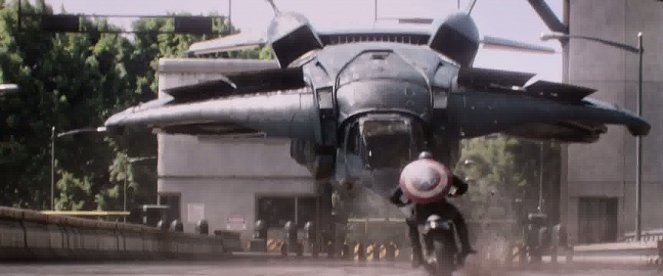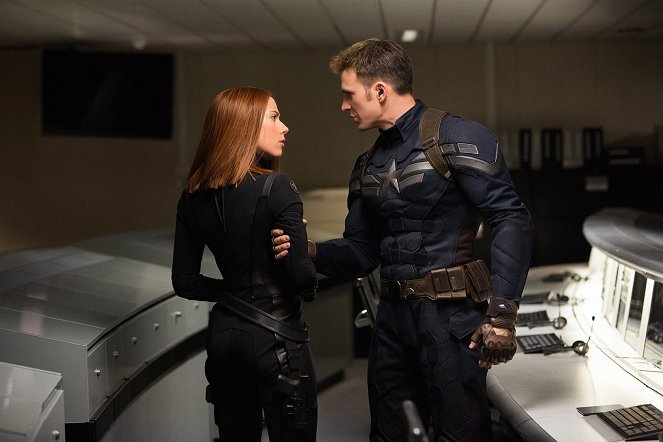Photographie:
Trent OpalochActeurs·trices:
Chris Evans, Scarlett Johansson, Samuel L. Jackson, Dominic Cooper, Sebastian Stan, Anthony Mackie, Cobie Smulders, Emily VanCamp, Robert Redford (plus)Résumés(1)
Après les événements cataclysmiques de New York de The Avengers, Steve Rogers aka Captain America vit tranquillement à Washington, D.C. et essaye de s'adapter au monde moderne. Mais quand un collègue du S.H.I.E.L.D. est attaqué, Steve se retrouve impliqué dans un réseau d'intrigues qui met le monde en danger. S'associant à Black Widow, Captain America lutte pour dénoncer une conspiration grandissante, tout en repoussant des tueurs professionnels envoyés pour le faire taire. Quand l'étendue du plan maléfique est révélée, Captain America et Black Widow sollicite l'aide d'un nouvel allié, le Faucon. Cependant, ils se retrouvent bientôt face à un inattendu et redoutable ennemi - le Soldat de l'Hiver. (Walt Disney Company France)
(plus)Vidéo (27)
Critiques (16)
Le deuxième Captain America, intelligemment déplacé dans le "présent", est plus sérieux et rempli d'action physique. Celle-ci se déroule principalement dans les rues (voitures et fusillades) et est agréablement dirigée par Samuel L. Jackson dans la meilleure scène. Cependant, l'intrigue conspiratrice est prévisible et devient confuse dans la seconde moitié. La diversité initiale des scènes d'action disparaît également dans la seconde moitié. Et la conclusion des scènes d'action exagérées n'est pas aidée par des retournements invraisemblables (sauvetage de dernière minute de n'importe où / n'importe comment). La curiosité du spectateur quant à l'identité de l'antagoniste intéressant perdure jusqu'à la fin. Ses liens historiques avec Captain America sauvent tout le contenu. En tant qu'amusement grandiose basé sur des bandes dessinées pour s'évader de la réalité, c'est OK.
()
Mon intuition et les recommandations d'amis étaient bonnes et je n'ai pas été déçu. Le deuxième volet était meilleur que le premier. Il y a de l'action, du suspense, du spectacle, et Captain America et Black Widow se complètent bien. Et leurs adversaires sont tout aussi impressionnants, ce qui nous permet de nous laisser emporter et captiver par l'aventure malgré sa simplicité. J'ai hâte de voir le troisième épisode !
()
Just as Three Days of the Condor and The Parallax View were responses to Watergate, the second Captain America can be seen as a Hollywood interpretation of the events surrounding WikiLeaks and the NSA. What Steve Rogers has in common with the protagonists of those films by Pollack and Pakula is that he doesn’t know what’s going on around him or who he can trust, thanks to which the filmmakers can further develop the “fish out of water” motif without copying The Avengers (where the new age was the main source of Rogers’s confusion). Besides the inwardly focused disillusionment of those 1970s thrillers, recalled through the iconography of Washington, the casting of Redford and the music, this new Marvel flick contains a bit of the Cold War conservatism of movies – such Rambo (especially the first and third instalments) and Rocky (which The Winter Soldier recalls at least with the filming of the opening run) – that championed direct physical action over data analysis. Again, just as in the first, intentionally old-fashioned Captain America, the traditionalist protagonist takes on references to films with a different value base than that on which contemporary society stands. However, those values are not so clear. Only the final third of the film is unambiguous. With regard to the protagonist’s application of straightforward military logic, the restoration of calm does not involve diplomatic negotiation, but large-scale action that becomes less clear the more the characters go at each other (raw firefights in the streets in the style of Heat thus replace fights in which the action is created solely by editing, music and sound rather than by movement). The spy games with a touch of paranoia after the originator of the “contagion” has been revealed – with the use of black-and-white framing similar to that used today by the Russian media to justify the annexation of Crimea – can come across as hypocrisy in a film that outwardly express unease about a cynical system while actually defending its ideology. However, this reading is at least partially called into doubt by the closing repudiation of some of the old structures. At the stylistic level, I enjoyed the smooth (perhaps even too smooth) transition from brisk political thriller to conservative superhero adventure and I take it as evidence of the effort to not rely solely on the guaranteed teenage target group, but to also appeal to new viewers. And the film appeals to female viewers more imaginatively than other comic-book adaptations. Not even one of the three female characters has an identity derived from a male character (though there is a romantic subplot, there is no time to develop it), there is no sexualisation of the female body and all of the heroines are as comparably independent and courageous as their male counterparts. In summary, I don’t think that The Winter Soldier (whose titular character, incidentally, wouldn’t even have to be in the film and doesn’t have much of an impact on the plot) was such a safe bet as it may have seemed and or could have afforded to be. 85%
()
(moins)
(plus)
For Marvel, good. I’m usually not a fan of this colourful conglomerate of comic book superheroes, but The Winter Soldier is (unlike its predecessor) a solid action blockbuster that entertained me a lot. The theme is relatively interesting and stimulating, though Marvel’s habit of “not going too deep” can make it frustrating at times with how superficially and simply the political, philosophical and technical aspects of the of the script are presented. But, as a summer blockbuster for the masses, it works fine. So, as I say, for Marvel, good. Next, on the umpteenth episode of your favourite series…
()
Marvel is a cult, outwardly accessible to everyone and open to unconventional souls for whom building their universe may be the ultimate peak stint. Yet inwardly, it is bound by the hard doctrine of Kevin Feige's infallibility and unwillingness to let go of the reins of even one brand. Cap steps into it quite uncompromisingly and holds on for a long time. The contact fights are once again cool, the plot is not a stupid rehash of traditional clichés, and the main villain enters with a really unprecedented vigor (excellently supported by Jackman's musical theme). The bad thing is that the grand rules of destruction have to be respected and in the end, everything collapses into a traditional 0 1 mess and the thriller game in the old-world tone becomes bitter in but a few moments (moreover, it stops being clear). I believe the Russo brothers had a very free creative hand on set, but the concrete dramaturgy for years to come must inevitably lead to hell. [I'd be quite interested to see how Shane Black zigzagged in IM3, as he more or less manages it here for almost 100 minutes].
()



Annonces